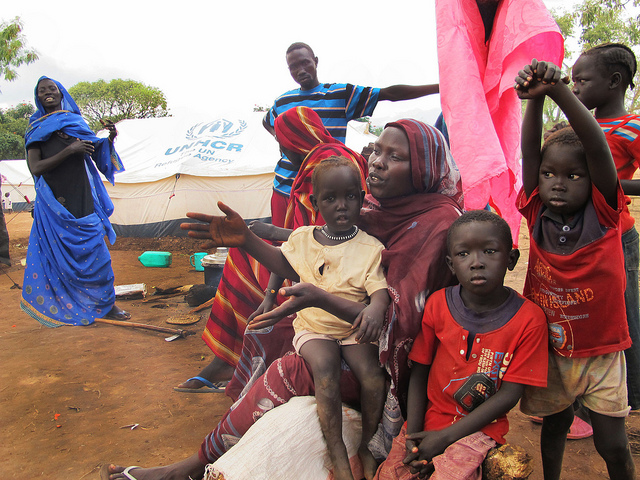
SHERKOLE REFUGEE CAMP, Ethiopia — “We left our homes with not even a cup like this one,” said Asma, gesturing toward a red plastic cup lying on the dirt ground next to her foot. Sitting on the trunk of a felled tree crowded on all sides by young children in this refugee camp on the border of Sudan, Asma recounted when fighting broke out in her village in Blue Nile state.
About an hour after midnight on September 2, Asma heard gunfire inside her town of Um Darfa. “When the gun fire intensified, we came out of the house,” she said, and discovered that fighting had begun between the Sudan Armed Forces, or SAF, and the Sudan People’s Liberation Army, or SPLA, who were part of the former Joint Integrated Units.
The JIUs, as they are known, were joint North-South army units established under the 2005 Comprehensive Peace Agreement, or CPA. Had Sudan remained united, the JIUs were intended to be the seed from which an integrated national army would grow. Instead, the joint units were in practice rarely cohesive and often themselves sources of instability. After South Sudan’s independence, the status of the SPLA-JIUs left in the northern states of South Kordofan and Blue Nile (largely composed of men native to the region) was left unresolved, and their reasons for taking up arms in the first place, unaddressed. The JIUs, conceived as a means toward national unity and peace, became the mechanism through which conflict would engulf the border areas of Sudan once more.
Following clashes between the former JIUs, Asma said, Antonovs began bombing Um Darfa around 10 a.m. Then soldiers, supported by Fellata militia—an ethnic group in the state—began pursuing and killing civilians, she said.
“Soldiers with small arms were chasing the civilians. They were supported by the Fellata who captured some of the civilians and slaughtered people,” she said. The militias and government forces did not spare children and pregnant women, Asma said angrily. “It’s all because we are black.”
When asked whether the militias or soldiers said anything to the civilians in their pursuit, Asma said the militias were shouting directions at each other, saying, “Grab the slaves.”
In the ensuing chaos, Asma began running with her three children, two of whom were still being breastfed. “When she ran, she didn’t even have a taub [body wrap], I had to give her one,” said Sara, the mother of Asma’s husband’s second wife, Mary. “You just scoop up any child you see, without even knowing if it’s your child.”
The journey to Ethiopia was long. For a week, Asma and her children ran with a group of about 50 other women. “From Zugay to Kambelle to Alman to Yarida to Yakhuru to [the Ethiopian town of] Bumbodi,” Asma said. “Many of the women, they had to leave their baby in their cribs.” Others from her town went west, she said, probably toward Damazine.
Most of the towns they ran through were empty, their populations having already heard that fighting had started. The arrival of Asma and the other women prompted those who remained to begin running as well. “There was nobody to help us,” Asma said.
In Sherkole camp, Asma still had no news of her husband, her mother, and the rest of her family. Her husband had been visiting his family in another village for Eid when the violence broke out.
“Nobody will attempt to go back,” said Mary. “Whoever could not make it to this place were scattered to the bush. We are sure no one is left in the village.”
The outbreak of hostilities was unanticipated and bewildering for Asma, who had confidence in the reconciliation between neighboring tribes and between the SPLA and the government since the signing of the CPA. “There were a lot of grievances because there were debts from the previous war, but we were able to live in peace after the war,” she insisted. “[W]e thought [war] was impossible. We worked so hard to work through our differences and reconcile and live in peace.”
The promise of the popular consultations— a political exercise meant to give voice to the aspirations of Blue Nile residents—also fell short of expectations for Asma. “When popular consultation people came” to raise awareness for the process, Asma said, “the Fellata told them we were all [members of the ruling] NCP, and that we didn’t need consultations.” She said that the Fellata stopped the process by intimidating and threatening people. “We were never even given a chance to know what it is,” she said.
With the arrival of war, divisions have been redrawn, and faith in reconciliation and peace—as embodied by the JIUs, popular consultations, and warming relations—left in the past. Conflict has placed Asma firmly on the side of the SPLA-North.
“We look at them as protectors. They are our sons. They are from us,” she said of the rebel group. “[The government] attacked their own people. If we were not attacked, perhaps we would be at home right now. That was wrong. We have to defend ourselves and get what is ours.”
This post is part of a series based on Enough interviews with Blue Nile refugees in Sherkole refugee camp and Kurmuk, Ethiopia. Details of these testimonies are impossible to verify, but accounts Enough heard have been generally consistent. Some names have been changed to protect the identity of the speaker. For background details about the conflict in Blue Nile, read our overview dispatch.
Omer Ismail contributed to this post.
Photo: Asma and her children in Sherkole refugee camp (Enough/Amanda Hsiao)

